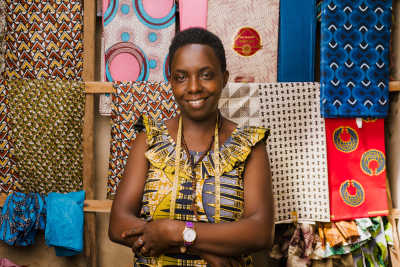
To mark World Refugee Week, we’re introducing you to Faustine, a 36-year-old tailor living in Mahama Camp, the largest refugee camp in Rwanda.
Faustine has lived there ever since she fled conflict in Burundi in August 2015, alongside her husband and their five children. It was in Burundi where she first learnt how to tailor.
Within Mahama, she now runs a successful tailoring business that supports her family and helps to provide clothing for children living in the camp. She also teaches other women and girls how to sew using one of the three sewing machines she now owns, out of the workshop built by her and her husband.
“I have tried to face poverty and its impacts because I was fortunate enough to be a refugee who has a vocational education” she explains. “The idea of teaching them came when I realised that there were many women sitting at home doing nothing. When you see the problems your peers face, you find how you can help. So, I started to teach them sewing and up to now, I have taught seven people – among them are women and girls.”

Faustine is one of the thousands of people living in Zambia, Rwanda and Sierra Leone to have benefitted from a joint programme – Branching Out: Financial Inclusion – funded by the Comic Relief and Jersey Overseas Aid partnership over the last five years.
The programme promotes financial inclusion, supporting people like Faustine, by developing their business, saving and investment skills with the help of local organisations. They include the Umutanguha Finance Company (UFC) which works within Mahama.
Emmanuel is a Project Manager for UFC and works within the camp. He says: “Some refugees lack the basic skills in creating and managing financial resources. So, we start by offering them financial literacy training. This training is available to all of our clients in refugee and host communities.”
He adds: “After training them, we show them the different banking services that are customised for their needs and make them feel there is a way to save, invest, and run a business that would lift them out of poverty.”
For refugees living in Mahama, these services are invaluable, as there is often a reluctance from bigger banks to allow them to open accounts due to a lack of identification papers. They also bring added security benefits, something Emmanuel has witnessed first-hand amongst the 3,000 plus customers they have helped in the past year-and-a-half.
“We’ve solved a lot of problems in this camp,” he explains. “Refugees have always had problems with the law enforcement in the camp due to stolen money and cases of destroyed banknotes due to lack of bank saving facilities – in addition to a lot of cash mismanagement and wastage. Such problems have declined thanks to our financial services among these refugee communities.”
It wasn’t always this way for Faustine. She first arrived at Mahama with only one sewing machine, a small collection of around 10 pieces of kitenge fabric [to make sarongs for women], and a place to establish a workshop.
She and her husband – a bricklayer by trade, who sometimes finds it hard to find work within Mahama because of a lack of construction work – would use the money they earnt, alongside a refugee living allowance, to support their family.
Since joining the UFC programme in 2021 she has been taught about financial services, and how to use financial loans and do business. She hasn’t looked back.
Faustine says: “I was offered a loan that I paid in six months. I was able to use it effectively and it has uplifted me. When I got the loan, I started to do a lot and purchased more textiles to make clothes for my clients…It really helps me as a tailor. It’s a good profession to have.”

“I earn that money in addition to the refugee living allowance – in a family with little children, that allowance is insufficient. So, you can see that this profession helps me to be able to take care of the children and the whole family.”
As well as dreams of opening a joint sewing school with the women she has trained, she also has hope for her children's well-being.
“Of course, it is difficult to be a refugee but the only hope I have and what I always ask God for is to give me strength and keep working my best to generate more revenue,” she says. “I also hope that if I continue working with the UFC, I know I will achieve the best.”
Find out more about Comic Relief’s partnership with Jersey Overseas Aid here.
